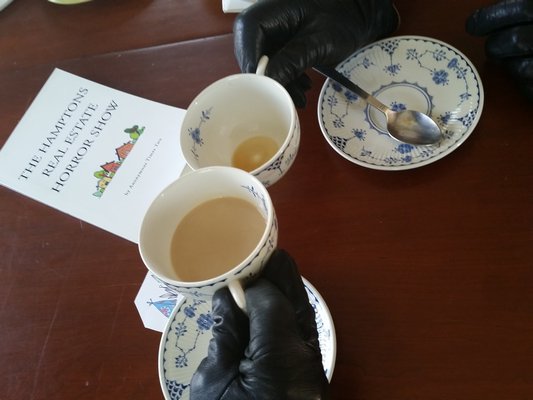
It’s been five years since “The Hamptons Real Estate Horror Show,” a book anonymously penned by two successful real estate agents, hit shelves and ebooks filled with tales of spoiled buyers, greedy landlords and sleazebag sellers. And—no surprise here—not much has changed since 2011.
A woman comes into the office asking to see houses “south of the highway.” Her budget isn’t large enough to fund what she wants, and knowing this, I try to persuade her to look north of the highway, where she can get a lot more for the money.
“I must be south of the highway,” she insists. When we get into the car and start out, she turns to me and asks, “What does ‘south of the highway’ mean, anyway?”
“Anonymous Times Two” have over half a century of South Fork real estate experience between them. And instead of meeting by the light of a glowing cigarette in a parking garage, they spoke over tea and homemade banana bread at a very posh East Hampton home to discuss the market and the people five years later.
“War stories,” said One with a rueful laugh. “You never run out of them.”
The original idea behind the book was not just to share the roman-a-clef goings-on in the real estate world. “We realized that every time we got upset,” One continued, “we could reread the stories and calm ourselves down.”
“We’ve met nice people over the years,” Two added. “But they don’t make for interesting stories.”
Office Manager: You’re being sued.
Me: I’m being sued? Who’s suing me?
Office Manager: The Graves. They say the house you rented them wasn’t clean.
Me: Why didn’t they call me?
Office Manager: I guess they’d rather sue you.
The incognito duo agreed that in general, the feel of real estate has gotten much nastier as of late. The plethora of reality TV shows that espouse house-flipping and DIY projects that promise to increase home values, along with the availability of websites like Zillow and Trulia, are making buyers and sellers more argumentative over price.
“The sellers want to make the price higher. They look at Zillow and say, ‘Well, my house is worth this amount,’ but they’re wrong, and they can’t be convinced otherwise. It’s insane,” said One. “We want to make the property fair market value. We know the area, we know the neighbors, but it doesn’t matter what you say.”
“Then” said Two, “you finally capitulate and list it at their asking price. And six months later they call and say, ‘It’s your fault the house hasn’t sold,’ and they go with a different broker at the price you originally suggested!” Brokers, Two said, are “invisible and replaceable.”
“This is a very nice house,” she says.
“I thought you’d like it,” I agree.
“Let’s see the kitchen,” she says.
“Come with me,” I reply. “It’s over here.”
“No Viking range?! Forget it!” she shouts.
“But honey, you don’t cook,” he reasons.
“The nature of real estate has changed so much,” added One. “There’s more in-fighting among brokers for listings. We used to really work as teams. And the group you were with was pretty constant. Now it’s like ‘Glengarry Glen Ross,’” One said, referencing the David Mamet play and film about a cutthroat New York real estate office, starring Amagansett’s own Alec Baldwin.
And new high-end brokerage firms that are putting down roots aren’t helping matters any. “Everyone is flocking to them because they offer 100-percent commission for the first year,” said One, meaning that the brokerage does not take a cut. “I think a lot of the brokers end up disappointed.”
The influx of upstarts looking for a quick buck has also affected the business. “They’re very perky and cute and vivacious,” said One. “And everything they say is wrong.”
Two said that the brokers who are doing the best are the ones who keep it all in the family. “Married couples, parents bringing their children into the business—it’s really smart,” she said. “It makes buyers and sellers feel safe, it’s a contrast against the homogeneity of the office environment, and it keeps the money in one place. It’s like a guild system.”
“When we started out, the Hamptons weren’t ‘The Hamptons,’” said Two, using air quotes. “The houses were simple, furnished with yard sale finds. The beach was the main draw. Tenants brought their own sheets and towels. They would leave come Labor Day, and come winter, the owners would drain the pipes and close the house until spring.”
“The more people who came out,” said Two, “the more amenities they wanted. Owners got greedy, and the prices went up. Houses ceased to be homes. Now they were investment properties. We would sell a home and a few months later get a call from that buyer asking how much they could get to flip the property.”
They agree that as the prices have increased, the market has produced fewer renters. “There are so many horror stories about rentals. And now a lot of people are nervous about the registry,” Two offered, referring to the East Hampton Town rental registry law passed in December, which requires homeowners to update the town every time a new tenant takes occupancy. “It’s a way for the town to make money. We were there—93 percent of the people were against it and it was passed anyway. It’s a sham. And it’s cut in on the market.”
But all in all, Anonymous Number Two wouldn’t change a thing about the East End.
“It’s still the most beautiful place,” One said with a sigh, taking a sip of tea. “Who knows? Maybe a house can once again just be a nice place to come home to, and this can once again be a nice place to live.”